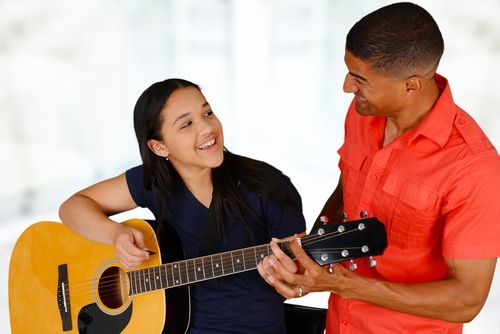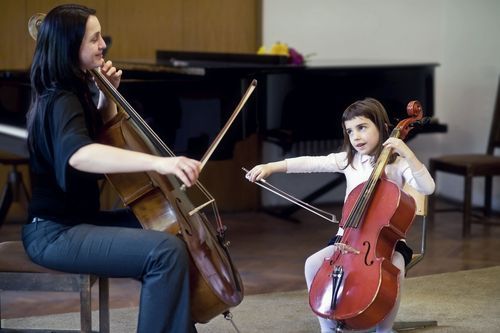To me, music is the absolute best thing in the world. I’ve been a music educator for over a decade now, and I’ve made the point to share this opinion with the hundreds of students I’ve taught over the years. Motivating students, especially ones struggling to master basic technique on their instrument, can be a monumentally challenging task.
Any line of work that involves working with many different people comes with a certain amount of unpredictability brought on by the fact that no two human beings are the same. Every student you interact with comes equipped with their own special strengths and challenges. This means that rigidity is not your friend as an educator. If you want to motivate students, you’ll need to learn what they value and tailor your lessons accordingly.
The importance of communication
 Designing lessons based off of your student’s likes and dislikes isn’t enough to motivate them. Actual learning can’t happen between educator and student without a strong line of communication. Every student is a wildly different human being, so how a student communicates is going to shift depending on the person’s personality and background.
Designing lessons based off of your student’s likes and dislikes isn’t enough to motivate them. Actual learning can’t happen between educator and student without a strong line of communication. Every student is a wildly different human being, so how a student communicates is going to shift depending on the person’s personality and background.
When I started teaching, I noticed a lot students would respond with saying things like “yeah” and “uh huh” when I would ask if they understood the things I was trying to teach. I’d say things like, “So Jimmy, do you feel like you have a pretty good idea of how to understand the circle of 5ths?”, and I would get an unenthusiastic head nod in response. It took me a long time to realize that head nods and uh huhs weren’t strong signs of communication from my students. Students can’t be motivated if they don’t understand or value what you’re trying to show them.
Now, I try asking students different sorts of questions to open up the lines of communication. The sorts of questions I ask change depending on the type of human being I’m trying to teach. All this means that I have to take the time to get to know who my students are.
Empathy as a teaching tool for motivation
This might sound strange, but empathy is a powerful tool that educators can use to teach and be motivating students. Empathy is simply the act of putting yourself in someone else’s shoes. Choosing to empathetically view your student might be the key to motivating them. Empathy asks us to consider what another person is feeling and why.
This is especially applicable for younger students. As adults, we’re often decades removed from what it feels like to be a child. Children deal with a myriad of challenges that adults can’t understand unless they make a point of practicing empathy.
Let’s say you’re having a difficult time motivating a 12-year old guitar student who has been taking lessons with you for six months. Rather than going through the motions and silently resenting your student’s lack of interest in their instrument, try thinking about them empathetically. Once you put yourself in your student’s shoes, ask yourself questions that can help identify what’s really behind their lack of motivation.
Maybe your student is coping with her parents’ difficult divorce. Or it could be that you’ve based your lessons around music theory and reading and all your student wants to do is learn how to play heavy metal. Empathy turns educators into investigators that look for clues to help them become better motivators.
Ideas for motivation
Even the best students struggle with motivation from time to time. If you’ve been teaching a student for a couple of years, you might have experienced someone hitting a ceiling of sorts as far as interest and motivation goes. Over the months and years, patterns and routines in lessons are developed that can sometimes thwart and hinder growth and development. For teachers who want to avoid this problem, it’s essential that they frequently change things up in their lessons. Adding new ideas, exercises and music into the lesson every months can ward off apathy by keeping your students challenged and engaged.

This means that you will have to expose yourself to new ideas and challenges yourself as an instructor. There’s nothing more damaging for a student’s motivation and interest than an unmotivated teacher. Break up your routines. Do something new in your lesson that gets your student thinking differently about their instrument. Even doing something as simple as changing the order of what you do in your lesson can have a positive impact on things. Maybe this week you skip the warmup with your vocal student and talk about song lyrics instead. There’s no one way to effectively motivate students, but apathy is your enemy, so make an effort to constantly be doing something new and fresh.
The most important thing

The most important thing about music lessons is, well, the music itself. I know that sounds so obvious, but it’s an easy thing to forget when you get caught in the routine of teaching student after student year after year. Motivating students is sometimes as simple as playing them a piece of music they’ve never heard before. Music is quite possibly the world’s most beloved and influential art forms. There’s songs and compositions about death, falling in love, going to war and the contemplation of what it means to exist in the universe. If your lessons aren’t revolved around the powerful ideas of music being accessible, important and meaningful, it will be a miserable time for you and everyone you teach.
As a music educator, it’s your job to preach the power of music. Music is for literally for everyone. Anyone can listen to, play and understand it if they want to. This all should be in the forefront of your mind when you engage with your students. Your lessons won’t be boring if you can effectively communicate the idea that music is a tool of empowerment for people of all ages, backgrounds and skill levels.
There is no one of motivating students, but hopefully these ideas will help you see you and everyone you teach in a new light. For more helpful articles about the world of music, check out the Musika Lessons blog.







